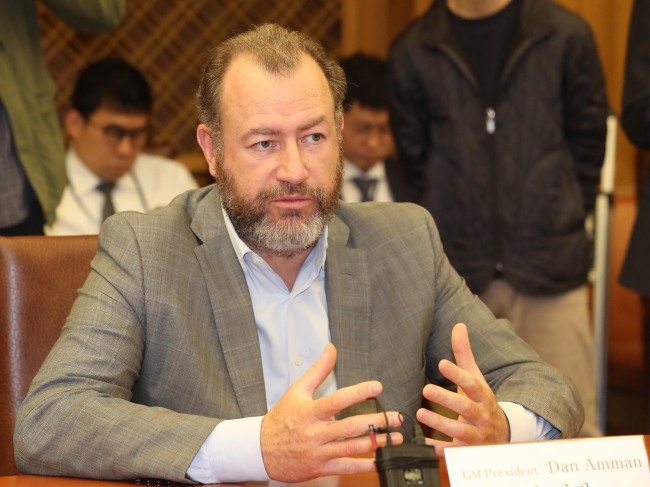General Motors on Thursday signed a conditional agreement with the Seoul government to help resolve the liquidity problems facing its South Korean unit, the state-run Korea Development Bank said.
In the deal to be finalized early next month, GM and the KDB agreed to inject a combined 7.7 trillion won ($7.15 billion) -- 6.9 trillion won from GM and 810 billion won from the KDB -- into the cash strapped carmaker.
 |
In this photo taken April 26, 2018, GM President Dan Ammann (L) speaks in a meeting with South Korean ruling party members about past achievements and the urgent need to fix cash problems at GM Korea. (Yonhap) |
In exchange for a fresh loan from the KDB, whose 17 percent stake in GM Korea Co. makes it the carmaker's second-biggest shareholder, the US auto giant vowed to allocate two new vehicles to its Korean plants and maintain its Korean operations for more than 10 years. It agreed to give the Korean policy lender veto power in key management decisions, a KDB official said by phone.
A compact SUV and a crossover utility vehicle are expected to be allocated to GM's three Korean plants at the end of 2019 and in 2022, respectively. The US carmaker said this will give the company a production capacity of 500,000 units a year in the plants starting in 2022, although production volumes will stay at 370,000-440,000 units for the three years through 2021.
The deal comes hours after GM President Dan Ammann said in a meeting with South Korea's ruling party lawmakers that the detroit-based carmaker was in the final stages of resolving the credit crunch facing its local unit.
"Over the last few months -- in particular over the last few weeks -- a lot of very good progress has been made. We stand here today very close to a resolution on most of these particular issues," Ammann said, referring to a "cash crisis" in the company.
Speaking from the perspective of GM Korea's stakeholders -- GM, GM Korea's labor union and the KDB -- he said, "From the beginning, we have shared a common objective, and that common objective is to make GM Korea a successful, thriving, growing and profitable company."
He said that, because of some issues at GM Korea, a number of very difficult steps have to be taken in order to reach that objective, but he did not elaborate further.
The related parties will be able to "disclose the final list of items over the next few hours and days," he said.
On Monday, the 12,000-member GM Korea union reached a tentative agreement on the self-help plan, which includes shutting down a plant in Korea, a wage freeze and forgoing bonuses. With the preliminary deal, GM Korea could avoid being placed under court-led bankruptcy protection.
In a vote held from Wednesday to Thursday, the union accepted the self-rescue plans for GM Korea. From 2014-2017, the carmaker posted 3.134 trillion won in accumulated net losses due to a lack of new models and lower demand.
In February, GM unveiled its restructuring plan for its Korean operations. The Detroit carmaker said it will shut one of its four Korean plants by May, while asking GM Korea workers to make some wage concessions and the KDB to provide financial support to turn the Korean unit around.
Back then, GM offered to share an investment of $2.8 billion between its Korean unit and the KDB in the next 10 years through 2027.
Separately from the deal, GM is expected to have talks with the Korean government to have its three remaining plants designated as foreign investment zones, thereby making them eligible for extensive tax benefits.
If the plants are desingated as foreign investment areas, GM Korea will be fully exempt from corporate taxes on its profits for the first five years and then pay only 50 percent corporate tax in the following two years.
In its application to have its plants designated as foreign investment zones, GM reportedly said it is aiming to achieve 100 trillion won in accumulated sales from 2018 to 2027 on combined production of 4.75 million vehicles at the three plants.
(Yonhap)








